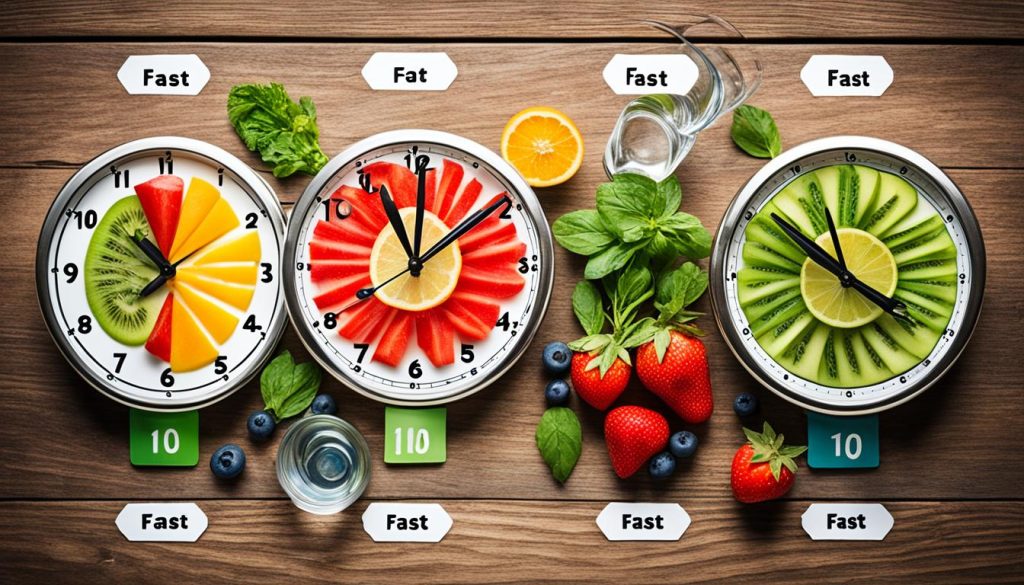Have you thought about how changing your eating habits could boost your health? Intermittent fasting is a simple change that’s gaining fans for its health perks. It’s a way to eat that could make you feel better overall.
It’s not just about losing weight. Experts say it can also make your mind clearer. We’ll look into how this eating pattern can lead to better health and happiness.
Quick Recommendation: Our blog takes you through the many health benefits of intermittent fasting. If you're interested in exploring intermittent fasting more comprehensively, we recommend the Intermittent Fasting Formula.
What is Intermittent Fasting?
Intermittent fasting is a way to eat that switches between eating and not eating. It’s different from other diets because it focuses on when you eat, not what you eat. This method is getting popular because it might help with health and lifestyle.
There are many ways to do intermittent fasting. For example, the 16/8 method means fasting for 16 hours and eating for 8 hours. The 5:2 method is another way, where you eat normally for five days and eat very little on the other two days.
What makes intermittent fasting special is how it changes your eating habits. By not eating for long periods, it can help with weight control and improve your metabolic health. Studies also show it can make your brain work better and help you live longer.
Intermittent fasting is flexible, so it can fit into many lifestyles. You can follow a 16/8 plan, fast once or twice a week, or alternate days. The main thing is to be consistent with the fasting schedule that suits you best.

How Intermittent Fasting Affects Your Body
Intermittent fasting changes your body in big ways. It makes your body use stored fat for energy instead of glucose. This helps you lose weight and makes your metabolism work better.
When you fast, your insulin levels go down, and growth hormone levels go up. This helps you burn fat and build muscle. It also starts fixing cells, which makes you healthier over time. Many people feel more energetic and focused because of this.

At a cell level, fasting makes your cells clean out damaged parts and make new ones. This process is called autophagy. It’s linked to living longer and fighting diseases that come with aging. Fasting also helps your heart, lowers inflammation, and improves health markers like blood pressure and cholesterol.
Learning about fasting’s science can motivate you to try it. It’s not just for losing weight. It’s a way to improve your overall health and get many benefits for your metabolism.
Different Types of Intermittent Fasting
Intermittent fasting has become very popular. There are many fasting methods for different lifestyles. The 16/8 method, 5:2 diet, and time-restricted feeding each have their own benefits and ways to eat healthy.
The 16/8 method means fasting for 16 hours and eating during an 8-hour window. It’s a simple and sustainable way to try intermittent fasting. You might skip breakfast and eat your first meal at noon. Your last meal could be by 8 PM.
The 5:2 diet lets you eat normally for five days. But, you eat only about 500-600 calories on the other two days. This method is flexible. It’s great if you don’t want to skip meals every day.
Time-restricted feeding matches your eating with your body’s natural rhythm. For example, eating in an 8-hour window during the day can help your metabolism and sleep cycle.
Knowing the differences between these fasting methods can help you pick the best one for you. Whether you choose the 16/8 method or the 5:2 diet, these plans are made to fit your schedule and eating habits.

How to Start Intermittent Fasting
Starting intermittent fasting might seem hard, but it’s easier than you think. Follow some key tips to make the switch easier for your body and life.
Beginners should focus on gradual adaptation. Start with a 12-hour fast instead of jumping into a longer one. This helps your body adjust slowly and lets you see how fasting affects you.
Meal planning is key when starting fasting. Prepare healthy meals ahead of time. Choose foods that are full of nutrients, like lean proteins, healthy fats, and lots of veggies.

Drinking enough water is crucial. Herbal teas and black coffee are okay too, since they won’t break your fast. But, if you feel weak or dizzy, you might need to eat more or talk to a nutritionist.
Starting intermittent fasting doesn’t have to be hard. Use these tips, like gradual adaptation and careful meal planning, to start your fasting journey with confidence.
Quick Recommendation: Our blog takes you through the many health benefits of intermittent fasting. If you're interested in exploring intermittent fasting more comprehensively, we recommend the Intermittent Fasting Formula.
Safety Concerns and Who Should Avoid It
Intermittent fasting can be good for health, but it’s important to know the risks. Not everyone should try it, and some should avoid it completely.
If you have diabetes, especially if you’re on a medication that lowers blood sugar, fasting can cause very low blood sugar. The American Diabetes Association says it’s key to talk to your doctor before starting to fast.
People with eating disorders like anorexia or bulimia should not try intermittent fasting. It could lead to bad eating habits. Pregnant and breastfeeding women should also avoid it. They need more nutrients for their health and their baby’s health.
Those with chronic health issues like high blood pressure, heart disease, or being underweight should be careful. The National Institute of Health suggests talking to a doctor before changing your diet, especially if you have health problems.

Intermittent fasting isn’t good for kids and teens because they need more nutrients to grow and develop. Anyone thinking about this diet should think carefully and get advice from a healthcare provider. This ensures it’s safe for their health.
Combining Intermittent Fasting with Exercise
Merging fasting with fitness might seem tough, but knowing how fasting affects your workouts is crucial. Many worry that fasting will lower their energy during exercise, especially during fasting times. But, with the right approach, you can keep up your performance and enjoy the perks of fasting and exercise.
Think about working out in the late morning, right after your first meal. This timing can help keep your energy high, since you’ve had some food to fuel you. Or, some folks do great in a fasted state, saying their performance doesn’t drop or even gets better.
Studies show that fasting and exercise can make your body more adaptable and help with recovery. Yet, it’s vital to pay attention to your body and drink plenty of water. Fasting might make you feel a bit less energetic, so you might need to adjust how hard you work out. Paying attention to how you feel before, during, and after workouts helps you find the best plan for you.
Adding strength training and cardio to your fasting and fitness plan is good for muscle and heart health. Eating a meal high in protein right after working out helps with muscle recovery and growth. With these tips, you can blend fasting with your exercise routine well, getting the most out of both for your health and performance.
Impact on Mental Health
Intermittent fasting isn’t just about better physical health; it also boosts your mental well-being. It helps improve mental clarity. Many people find they think more clearly and focus better when they follow this diet.
This clearer mind comes from the body using ketones for brain fuel during fasting. Stress resilience is another big plus. Regular fasting makes it easier to handle stress, thanks to changes in brain hormones.
This leads to a calmer, more balanced mood. People may feel less anxious and depressed, enjoying a more stable emotional state.
Studies are looking into how fasting affects brain health. They suggest it may protect against diseases that harm the brain. These studies also show better learning and memory skills.
It seems that fasting could be good for your brain health over time.
Our eating habits are closely linked to our emotional health. Intermittent fasting affects brain-derived neurotrophic factor (BDNF) levels. BDNF is key for brain function and mood.
By increasing BDNF, fasting could make you feel happier and more resilient emotionally.
Overall, fasting offers more than just mental clarity and stress handling. It’s a way to improve your mental health fully. It helps with better focus, stress management, and mood.
Common Mistakes to Avoid
When you start intermittent fasting, some mistakes can stop you from getting the most out of it. One big mistake is not sticking to a regular fasting schedule. It’s important to be consistent to make it a habit.
Another mistake is not eating enough during your eating times. Intermittent fasting doesn’t mean you should eat very little. Try to eat meals that are full of nutrients to support your body.
Not drinking enough water is another error to watch out for. Make sure to drink water during both fasting and eating times. This helps you stay hydrated and supports your body. Also, try to avoid eating too many processed foods during your eating times. They can mess up your efforts and lead to bad eating habits.
Lastly, not listening to your body can cause problems. If you feel bad, you should change your fasting plan or talk to a doctor. By avoiding these mistakes, you can make your fasting habits more effective and reach your health goals.
Conclusion
You’ve explored the world of intermittent fasting deeply. Now, you know what it is, its effects on your body, and its various forms. It’s all about understanding and making choices that fit your health goals.
Adding regular exercise and focusing on mental health can boost its benefits. It’s not just about discipline but also finding balance. By avoiding common mistakes, you’re set for a successful fasting journey. Many people have seen positive changes in their health thanks to it.
If you’re new or already on this path, intermittent fasting is a great tool for reaching your health goals. Think about what you’ve learned and decide what’s best for you. Your fasting journey is personal, and with the right steps, it can change your life.
Quick Recommendation: Our blog takes you through the many health benefits of intermittent fasting. If you're interested in exploring intermittent fasting more comprehensively, we recommend the Intermittent Fasting Formula.

